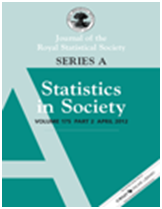A stochastic model for assessing Chlamydia trachomatis transmission risk by using longitudinal observational data

Bacterium Chlamydia trachomatis causes genital chlamydia infection. Yet little is known about the efficiency of transmission of this organism. Ethical constraint against exposing healthy subjects to infected partners precludes the possibility of quantifying the risk of transmission through controlled experiments. This research proposes an alternative strategy that relies on observational data. Specifically, we present a stochastic model that treats longitudinally observed states of infection in a group of young women as a Markov process. The model proposed explicitly accommodates the parameters of Chlamydia trachomatis transmission, including per-encounter sexually transmitted infection acquisition risks, with and without condom protection, and the probability of antibiotic treatment failure. The male-to-female transmission probability of Chlamydia trachomatis is then estimated by combining the per-encounter disease acquisition risk and the organism's prevalence in the male partner population. The model proposed is fitted in a Bayesian computational framework.
A stochastic model for assessing Chlamydia trachomatis transmission risk by using longitudinal observational data

Bacterium Chlamydia trachomatis causes genital chlamydia infection. Yet little is known about the efficiency of transmission of this organism. Ethical constraint against exposing healthy subjects to infected partners precludes the possibility of quantifying the risk of transmission through controlled experiments. This research proposes an alternative strategy that relies on observational data. Specifically, we present a stochastic model that treats longitudinally observed states of infection in a group of young women as a Markov process. The model proposed explicitly accommodates the parameters of Chlamydia trachomatis transmission, including per-encounter sexually transmitted infection acquisition risks, with and without condom protection, and the probability of antibiotic treatment failure. The male-to-female transmission probability of Chlamydia trachomatis is then estimated by combining the per-encounter disease acquisition risk and the organism's prevalence in the male partner population. The model proposed is fitted in a Bayesian computational framework.
